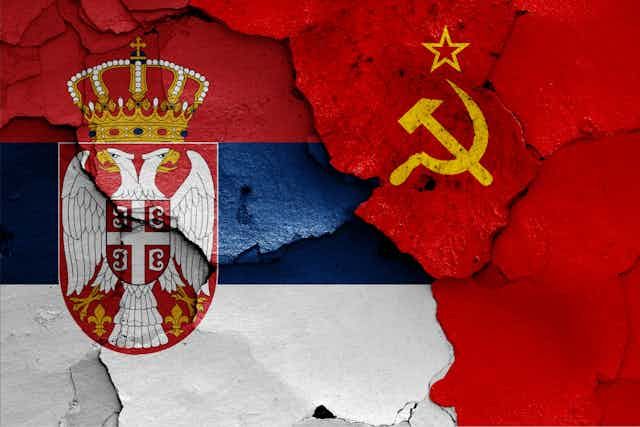Over the past few weeks, international attention has focused on Ukraine in the run-up to the second anniversary of the full-scale invasion in February 2022. But Ukraine is not the only part of Europe where Russia is seeking to assert its influence and control.
Often overlooked by the international community in a world beset by international crises, Serbia, another aspiring member of the European Union, finds itself at a crossroads between pursuing its future within the bloc or staying within Moscow’s orbit.
Despite the promise of greater prosperity within the EU, many fear that Serbia is moving closer to the Kremlin again. Indeed, Serbian president Aleksandar Vučić announced in February that he had purchased an anti-drone system, combat vehicles and infantry equipment from Russia.
The country has been historically close to Russia. In modern times, this relationship was cemented by Russia backing Serbia’s opposition to Kosovan independence. The Kremlin was against the province becoming an independent nation and suggested this would be a breach of international law.
Russia remains popular among many Serbs, and the country has refused to follow the rest of Europe in imposing sanctions on its old ally over the Ukraine invasion.

Many non-Serbs in the western Balkans distrust Russia, particularly because of its long-term support for Serbia – and those fears were exacerbated by the full-scale invasion of Ukraine.
Indeed, before the invasion Russia showed whose side it was on in the Balkans when Moscow wielded its UN Security Council veto in 2015 to prevent a resolution that would have recognised the Srebrenica massacres as genocide on the 20th anniversary of those atrocities during the Balkan war. Around 8,000 Bosnian Muslims were slaughtered in Srebrenica.
The narrative of genocide denial in the Russian media was even used to counter accusations of atrocities by Russian forces in Ukraine, notably Bucha. A report on Russian state-controlled First TV said:
Recall that [Srebrenica] has become synonymous with the genocide of the Muslim population, which, according to the west, was committed by the Bosnian Serbs in July 1995. But over time, many facts appeared confirming that a well-planned operation was carried out in Srebrenica, behind which stood western intelligence services.
Russia has long had a role in the western Balkans and sees its partnership with Serbia as a means of countering western influence in the region. This means Russia pulling Serbia away from forging closer ties with the EU and as former US ambassador to Nato, Kurt Volker, said at the time: “Moscow wants to make it clear that the Balkans won’t be part of mainstream Europe.”
Recent elections in Serbia, condemned by EU observers as being “below the expected standards for an EU candidate country”, added to concerns especially when demonstrators were condemned as “thugs” by Vučić , who thanked the Russians for tipping him off in advance that the protests were taking place.
Serbia also refuses to align with the rest of Europe in imposing sanctions on Russia with Vučić recently telling Tass, Russia’s state-run news agency: “You have many friends in Europe, but they all imposed sanctions against you. The only country that did not introduce sanctions is little Serbia.”
Vučić has also signed cooperation agreements with Moscow. Russia’s soft power remains strong in the country where the population regards Russia as its “greatest friend” and one survey found 63% blame the west for Russia’s war in Ukraine.
EU and the Balkans
The EU is at its heart a peace process, first formed from the carnage of the second world war. That peace was shattered by the Balkan wars of the 1990s and the genocide that took place during the conflict, notably during the war in Bosnia. That failure still haunts EU decision makers.
In June 2003 at the EU Western Balkans Summit in Thessaloniki in Greece, European leaders decided to identify the countries of the region, as potential candidates for membership, including Serbia.
In September 2013 a stabilisation and association agreement between Serbia and the EU came into force. A conference in January 2014 signalled the start of the formal accession process, setting out areas of reform Serbia needed to complete before being accepted as a member.
Serbia’s accession is particularly important for regional stability, given its size and role in past conflicts. If the EU is a project that wants to deliver peace and stability, it is difficult to see this as being successful in the western Balkans without including Serbia.
But talks have been far from smooth. Neighbouring Croatia which was earmarked by the EU as a future member at the same time as Serbia, in 2003, became a full EU member in 2013, but Serbian negotiations to become part of the EU have edged forward slowly. There is also a challenge with 40% of Serbs favouring an end to membership talks.
Vučić’s efforts to seek favour with Moscow will harm his country’s chances of EU memberships talks progressing any further. That could have profound regional consequences and weaken efforts to isolate Russia.
In recent years the EU has experienced an awkward partnership with Hungary, whose pro-Kremlin leader Viktor Orbán recently held up EU plans to send aid to Ukraine. Disunity has caused Nato and the EU problems in the face of Russian aggression. That leaves the EU concerned about having another partner with worryingly close links to Russia.
The looming US election, which could result in a Trump presidency that threatens a US withdrawal from Nato, could exacerbate those concerns. Conversations are stepping up in European capitals over how to ensure that the EU and other European democracies can work together to ensure stability on the continent in the face of Russian aggression.
That work will continue to focus, rightly, on Ukraine. However, as in the past, there are pitfalls in disregarding the challenges in the western Balkans and failing to pay attention to “little Serbia” could have far reaching consequences.

